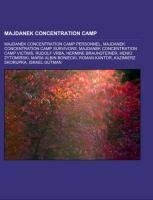
-
 Anglický jazyk
Anglický jazyk
Majdanek concentration camp
Autor: Source: Wikipedia
Source: Wikipedia. Pages: 26. Chapters: Majdanek concentration camp personnel, Majdanek concentration camp survivors, Majdanek concentration camp victims, Rudolf Vrba, Hermine Braunsteiner, Henio Zytomirski, Maria Albin Boniecki, Roman Kantor, Kazimierz... Viac o knihe
Na objednávku
12.67 €
bežná cena: 14.40 €
O knihe
Source: Wikipedia. Pages: 26. Chapters: Majdanek concentration camp personnel, Majdanek concentration camp survivors, Majdanek concentration camp victims, Rudolf Vrba, Hermine Braunsteiner, Henio Zytomirski, Maria Albin Boniecki, Roman Kantor, Kazimierz Skorupka, Israel Gutman, Max Koegel, Erna Wallisch, Arthur Liebehenschel, Igor Newerly, Otto Freundlich, Hildegard Lächert, Moshe Rynecki, Hermann Hackmann, Eric Muhsfeldt, Herta Ehlert, Luise Danz, Emil Zinner, Omelyan Kovch, Hermann Florstedt, Ilja Szrajbman, Halina Birenbaum, Ernst Bachrich, Richard Wendler. Excerpt: Rudolf "Rudi" Vrba, born Walter Rosenberg (September 11, 1924 - March 27, 2006) was a Slovak-Canadian professor of pharmacology at the University of British Columbia, who came to public attention during the Second World War when, in April 1944, he escaped from the Auschwitz concentration camp in German-occupied Poland with the first information about the camp that the Allies regarded as credible. The 32 pages of information Vrba and his fellow escapee, Alfréd Wetzler, dictated to horrified Jewish officials in Zilina, Slovakia-in which they offered extensive detail about the mass murder taking place inside Auschwitz, including a description of the layout of the camp and the use of gas chambers-became known as the Vrba-Wetzler report. Three weeks before Vrba escaped, German forces had invaded Hungary-an ally of Nazi Germany-and SS officer Adolf Eichmann had arrived in Budapest to oversee the deportation to Auschwitz of the country's Jewish population. Mass transports began on May 15, 1944, at a rate of 12,000 people a day; they were led to believe they were being resettled, but most were sent straight to the gas chambers. Details from the Vrba-Wetzler report alerting the world to what was happening inside the camp were broadcast in Czech and Slovak on June 15, 1944, by the BBC World Service and reported several days later by The New York Times, prompting world leaders to appeal to Hungarian regent Miklós Horthy to halt the deportations. He ordered them to be stopped on July 7, fearing he would be held personally responsible after the war; 475,000 had already been deported, but another 200,000 were probably saved. The timing of the report's distribution remains a source of controversy. It was made available to officials-including the Jewish community's leadership-in Hungary and elsewhere at the end of April, but for reasons that remain unclear it was not disseminated widely until weeks later. Vrba believed more lives could have been saved had the officials published it
- Vydavateľstvo: Books LLC, Reference Series
- Rok vydania: 2012
- Formát: Paperback
- Rozmer: 246 x 189 mm
- Jazyk: Anglický jazyk
- ISBN: 9781157873563






 Ruský jazyk
Ruský jazyk 





